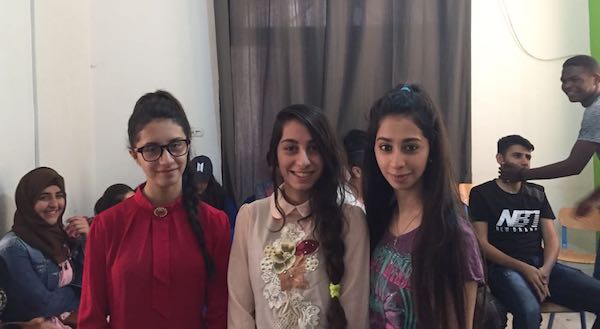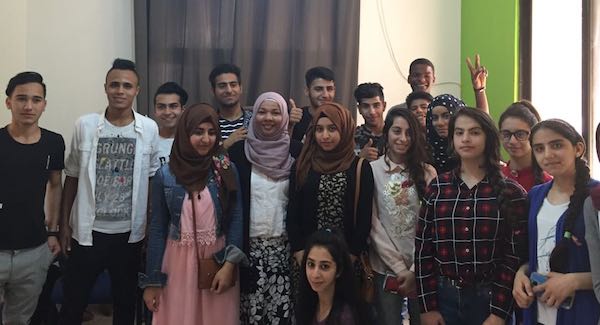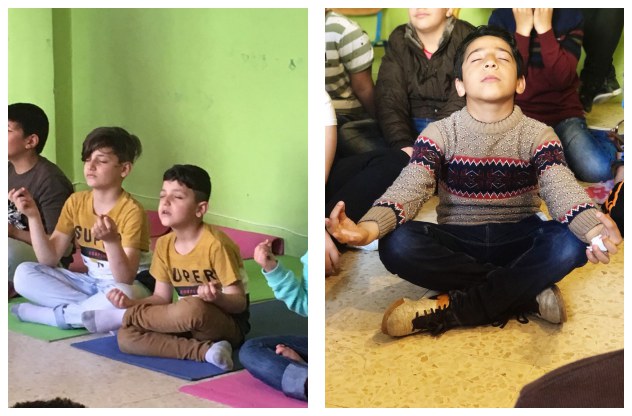Tricia R. Saur, Target Chair with contributions by Site Visit Participants
A good deal of our time at CRP was spent with the children and youth. We observed and interacted with the two recently graduated Super Girls groups, the kids yoga classes and the teen group. We learned a great deal from them and have a more nuanced appreciation of how important these classes are.
We were incredibly fortunate to hear first hand from both CRP’s Education Specialist, Karam Hayef and Beryl Cheal, the Education Consultant who designed the Super Girls program. Their presentations broadened our understanding of the challenges refugee children and youth face in getting their education. This was brought to life when the teens shared their perspectives.
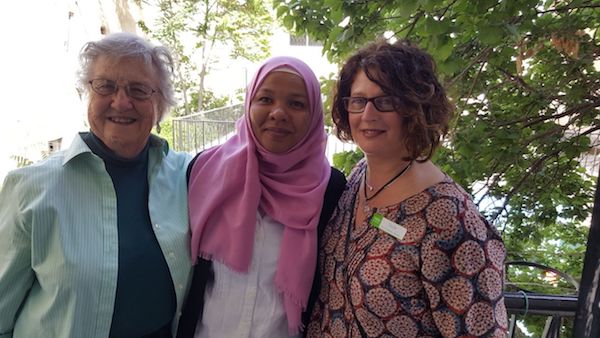 Beryl Cheal, Karam Hayef, Tricia R Saur
Beryl Cheal, Karam Hayef, Tricia R Saur
Super Girls
I want to start by sharing a slightly modified version of a post Amy Partick (North American Connection) wrote for her travel blog - In it she ties together so much of what Super Girls is about:
“During our three-day site visit to the Collateral Repair Project in Amman, Jordan, we were lucky enough to have a session with both the creator and the coordinator of the Super Girls program, funded by FAWCO’s Hope Beyond Displacement target project. Education Consultant Beryl Cheal is an American with an extensive background in developing early childhood education programs around the world and Education Specialist Karam Hayef is a Palestinian refugee and former teacher. Both women were clearly excited and eager to share their experiences in developing and implementing Super Girls at CRP.
As Beryl and Karam began to take us through a typical session of Super Girls – from the arrival rituals, to encouraging calm communication, to allowing the girls to select a small treat before departing – the main theme of these sessions that had never even crossed my mind became glaringly apparent. Children need structure and stability. “Thanks, Captain Obvious,” I hear you all say with an eye roll. Hear me out…
Until I attended this session, I think I identified with many other volunteers or charity donors who mean well and are willing to give time and money to a cause without really knowing the full details of the problems or the solutions. I think most people would agree that donating time or money to feed and house refugees is a good thing. If refugees have a place to live and food to eat, they can get on with rebuilding their lives and educating their children, right? As it turns out, it really is not that simple, especially for children who have had their lives turned upside down and have possibly witnessed traumatic events.
According to Beryl: “There are normal responses that kids have to these of circumstances of war, violence, and dislocation. One might be confusion about what’s happening. One might be the feeling that life is out of control. One might be the feeling that they can’t trust adults anymore. They don’t care about anybody else. There’s a lack of empathy or a lack of self-confidence.”
Beryl and Karam explained that the Super Girls curriculum was created to help children feel that they have some kind of control over their lives at a time when everything around them seems out of control. The sessions always begin with the same rituals, so that the girls know what to expect when they arrive. The girls are taught how to focus on their breathing by moving their arms up and down with their breaths. A special teddy bear that’s passed around the circle is the key to being heard; a girl who wants to speak must wait for her turn to have the bear in hand to do so. This is a safe space for the girls to talk about their problems and develop coping mechanisms to help them when they are not at the center. Speaking calmly and clearly in front of the rest of the group helps to build each girl’s self-confidence. Maybe most importantly, the girls begin to realize that they are not alone in what’s happening in their lives or how they feel.
Karam also feels that bringing an educational activity to each session is important. While these sessions cannot take the place of receiving a formal education, they can encourage those who are not currently in school, for a variety of reasons, to want to resume their studies.
I was always going to be on board with a program named Super Girls but I will admit that I went into the session thinking that it was a ‘nice to have,’ ‘cherry on top’ kind of non-essential program championed by a women’s group. Surely these refugees had bigger problems that we should be targeting? No, it turns out that Super Girls is giving participants vital skills they need to cope with their new realities and move on with their lives.” - Read Amy’s full blog HERE
At each session the girls recite a simple but powerful poem:
Growing Friendship Wish
May all I think,say, and do,
Not Hurt anyone
And help EVERYONE
“Super Girls is a six-month program consisting of fifty lessons is based upon a curriculum developed by Beryl. It is known as the kindness curriculum. It gives girls techniques to understand what has happened to them, and it encourages the girls to feel a sense of pride for their own cultures.
I was fortunate enough to observe one of these sessions led by Karam, a Palestinian refugee who has been an English teacher for eleven years. I was welcomed to sit on the carpet within the circle of girls aged 9 to 12. The girls noted my six foot height in Arabic to Karam. Of course even before the English translation I had the gist of what was said as the girls smiled and gestured my height by holding their hands high above their heads to signify my height.
The session began by going around the circle discussing what they done the day before. Sara, a Syrian refugee who volunteers at the centre, sat next to me translating everything that was being said. Then a children's book about bread was read. It went through all of the steps needed to make it. The girls took turns sharing ideas on the book, and after my group left they made bread. I felt privileged to have been able to have shared this session with them. It caused a resurgence of happy memories from the time when I had taught children their age.” - Tara Scott (AWC Central Scotland)
Sandy Gogel (AWG Paris) was impressed by the group work where the girls created hand drawn wall-length murals…
“Some of the images I remember seeing were a church, a Mosque, a women wearing a Burqua with words next to her in Arabic. There were colorful houses and many details like camels and tents. One girl stood to explain that this mural represented “The Way Life Was” and I could see that it was a representation of all the good memories that the girls had about where they came from. There were no guns or signs of war or unhappiness—just colorful reminders of where they used to live and the words in Arabic were words of joy and hope. I loved this mural and what it represents to the children. It is there to remind them of what life was about and all the good and pleasant memories. It is about going forward with joy and happiness.”
Therese Hartwell (FAUSA) gained some unique insight into the degree of attention given to many program details in a conversation with Beryl:
“Beryl talked about the need to educate teachers on alternative ways of presenting material to kids who have been traumatized, including two important components--allowing children to make decisions and encouraging children to think of the future. While these components are important for all children, they are critical for kids post-trauma. In this context, small details are important. For instance, Beryl described how, at the end of a session, she has the teachers allow the students to choose their own snack--even when they are essentially all the same--for instance, all bananas. Even these minor choices give the children some sense of control and empowerment when most aspects of their lives have spun out of control.
Beryl also has the teachers make a point to say things like, "I will see you tomorrow" or "Thursday when we meet, we will read a book." While these may seem like obvious things to say, talking about a short time in the future allows the kids to believe that they have a future.”
“Meeting Beryl Cheal, the education consultant and "Inspiring Woman" who designed the Super Girls program, was an unexpected bonus to our trip and a wonderful surprise! Beryl's work with the Super Girls was sensitive, intelligent and heartwarming, and learning about the program brought home to me just how significant an impact Hope Beyond Displacement is having on the people it helps. Beryl said two me on two separate occasions that the Super Girls program could not have happened without FAWCO. We should be very proud!” - Sallie Chaballier (AAWE Paris)
Challenges…
Education is the focus of this Target Program, however it is also a significant challenge for the children and youth of the refugee population our Target Project serves. There are many reasons for this, some of which we explored in the January blog: Getting an Education in Jordan.
According to estimates, there are about 660,000 Syrian refugees in the country.
Slightly over half that number are children aged 17 or below. - UN News February 2018
These staggering statistics make providing educational opportunities for school age refugee children a difficult challenge. But this is only part of the story as we learned during our visit. Sometimes refugees make choices not to enroll in school even when they have opportunities to do so (or decide to drop out). I am not sure that many of us had considered this and we were most interested to learn more the reasons for such decisions.
I am partnering with WangDi Schadendorf, (AWC Hamburg), to share takeaways from our time with Karam Hayef, CRP’s Education Specialist and the teens at CRP, who shared their current frustrations and future hopes. Culture and religion play a role for some refugees in deciding not to send their children to school; Trauma and fear of bullying and discrimination do too.
“The refugees we met come primarily from Iraq and Syria. What some of us didn’t realize was how much diversity there is among these populations. In addition to the Muslim and Christian religions there are smaller sects (i.e. Mandaean) represented which don’t fully fall into either of these major religious groups. There are also smaller ethnic groups which have been displaced from their traditional lands. At CRP individuals are accepted without question and such differences are not barriers to participation at the center. People feel safe here and all are welcome.
This is not necessarily the case in the public education system, or at least this is the perception. Jordan is a Muslim country and Islam is taught and the Koran is read at school. For families who have been traumatized, have lost their cultural connections and feel insecure about their futures, sending their children to schools where their children are taught another religion can be difficult to accept. Fear of discrimination or bullying by fellow students due to refugee status is also a reason parents and teens alike cite as their reluctance to use the public schools.
In addition, the school system is overburdened; providing educational opportunities to refugee children has stretched teaching and school infrastructure resources thin, affecting the quality of education to both Jordanians and refugees. It is not uncommon for Jordanian schools to have two shifts per day to accommodate increasing numbers of students. Refugees students are often segregated and attend afternoon classes. This is seem as a second rate education because the teaching day is shorter and teachers are tired having just completed a shift first of teaching.
For these reasons (and others), some parents decide they will keep their children home and await resettlement to a new country for their children to resume their education.. The problem here lies in the fact that resettlement usually takes years, if it happens at all. This results in many children losing precious time.
After missing years of school older children can no longer enroll in the public school system because they have fallen too far behind. They must go to private schools to gain literacy and numeracy skills they have either lost or never full acquired. For older students this is embarrassing and difficult to overcome - even if they should be able to afford the tuition.
Yet is was clear that these kids want to learn but they want to do so in settings where they feel safe and accepted. There was a distinct impression that they wanted CRP to educate them. CRP does provide some literacy and numeracy classes as well as skills training, but they are not a school and do have the resources to become one. “ - WangDi Schadendorf, (AWC Hamburg) and Tricia R Saur (AIWC Cologne)
CRP Teens
Julie Mowat (AWC The Hague) and Kathy Coughlan (FAUSA) were both moved by the Teen Group and share these impressions:
“The large group of teens looked like teens all over the world. There were the bold, the ones sitting in the back smirking, the ones that wanted to be called on, and the shy ones. And when they laughed and smiled, we all laughed and smiled. They talked about their dreams and wishes. Some talked about why they dropped out school. One girl talked about wanting to be a soccer star and one boy talked about wanting to be a musician and how he loves playing guitar. Their hopes and dreams are not unlike most teens.
This was the most heartbreaking for me. Kids stuck, due to circumstances out of their control, with very limited choices in life. They want to learn and there is little opportunity, they will want to work which is against the law, and they all want to go back to their country or get resettled. When asked where, all of them said to Australia. America was never mentioned. Seems that they feel no hope of getting resettled to America. As an American, I know how much our country has to offer and how we would be enriched to have them. Deeply unsettling!
I will never forget my time meeting the teens at CRP!” - Julie Mowat (AWC The Hague)
“The Teen Group was very well attended with both sexes well represented. There were also older members that had been allowed to join that were in the early twenties.
The older males in the group were quite vocal and answered most of the questions. A question was asked what they missed the most from their home country. Three sisters answered that they missed their Dad as they had to leave him behind. This was very raw and they broke down in tears and all let the room.
Another question was asked as to how many wanted to return to their home country. There were a few that wanted to return but most did not want to return to their home country.” - Kathy Coughlan (FAUSA)
Yoga...
One of the the things that impresses me most about CRP is their focus on healing and well-being through mind-body techniques like yoga. Participants were given the opportunity to observe the the kids and teens during their yoga classes on Saturday as well as learn how yoga is incorporated into the Super Girls program. Hope Moore (Munich IWC) and Celeste Brown (AWC The Hague) share their observations and thoughts with us here:
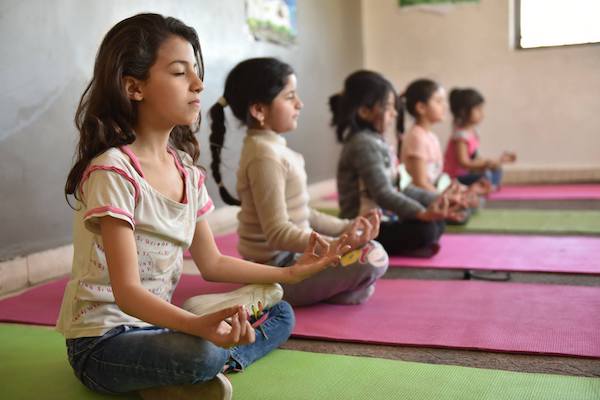
“The leader asked the girls to tell their favorite Super Girls activity and the answer was unanimous - YOGA! I've thought a bit about why these young girls like yoga so much. I suspect it is because yoga gives them a moment of calmness and stillness that they might lack in other parts of their lives.
During the exercises, the girls were attentive, engaged, and showed their trust in the leader by listening carefully. It is clear that much thought has been given to the Super Girls curriculum, teaching them skills to help them live amidst chaos.
The girls were proud to show us how super Super Girls is. And I was proud to be there to experience their pride first hand. “ - Celeste Brown (AWC The Hague)
“Yoga for Kids – Exercise for Fun and Relaxation”
"On Saturday afternoon CRP holds a Kids Yoga class. Both girls and boys participate. I was lucky to observe a class of about 15 smiling and energetic children. The class takes place on Saturdays in a spacious, bright and colourful room. Each kid has their own yoga mat and space to move freely through the yoga positions.
Emad, the young man who volunteers as the yoga leader, was trained in yoga instruction at the CPR center. His training includes trauma-sensitive yoga training. He smiled and supported the kids as they laughed and enjoyed some familiar yoga positions and tried some new ones too. Emad was sensitive with the kids and gave each child individual attention and assisted them with their yoga positions, while they often giggled with pleasure. I could see he was aware of each child and accepted their unique needs and abilities. I can’t imagine when these refugee children have been through but as I looked around the room I saw kids in the peaceful environment, enjoying their yoga workout, while relaxing, amused with each other and enjoying the time on their yoga mats.”
- Hope Moore (Munich IWC)
“During the Teen Yoga session, I observed the mixed group of boys and girls to be:
Respectful
Attentive
Listening
Proud
Trusting
Daring to try new things
Accepting help openly and without hesitation
Doing their best to follow directions
Having a good time
Not embarrassed by attempting various physical poses in front of a group of foreign women
Cheating a bit! Who doesn't? (I saw a boy holding his foot flat against the wall behind him to keep himself from falling over)
Hopefully the teens use these skills outside of CRP as well. They are positive life skills that will help them find a balance in their disrupted lives as well as hopefully leading productive lives in the future.” - Celeste Brown (AWC The Hague)



